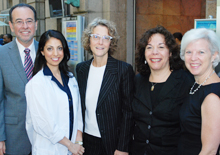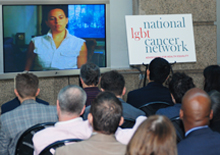HHC Will Adopt Mandatory Cultural Competence Training for Staff to Improve the Health of Lesbian, Gay, Bisexual, Transgender New Yorkers
First Public Healthcare System in U.S. to Mandate Comprehensive Training Program to Address LGBT Health Disparities;
HHC Responds to Recent Policy Recommendations by Institute of Medicine and the U.S. Department of Health and Human Services
May 25, 2011
New York City Health and Hospitals Corporation (HHC) President Alan D. Aviles, Deputy Mayor Linda Gibbs and National LGBT Cancer Network Executive Director Liz Margolies today announced the launch of a mandatory employee training program that will improve access to healthcare for lesbian, gay, bisexual and transgender (LGBT) individuals and help to reduce health disparities related to sexual orientation and gender identification. The training will teach staff to provide respectful, patient-centered and culturally competent healthcare services to thousands of LGBT New Yorkers who are served by the public hospitals, community health centers and nursing homes every year. The landmark curriculum was launched at Bellevue Hospital at a presentation and special screening of a new training video, “To Treat Me, You Have to Know Who I Am,” before LGBT consumers, LGBT community advocates, healthcare providers and elected officials.

HHC President Alan D. Aviles,
Dr. Reema Batra,Liz Margolies,
Rosemary Lopez, Deputy Mayor
Linda Gibbs
Audience watches HHC training video.
“The New York City Health and Hospitals Corporation stands ready to respond to the diverse needs of lesbian, gay, bisexual and transgender patients under our care and lead our colleagues across the country in cultural competency,” said HHC President Alan D. Aviles. “With this training, we reaffirm our commitment to serve LGBT New Yorkers—and all of our patients—in the most respectful and responsive way, while we provide safe, quality healthcare.”
“Cultural competency is a key tool for closing the disparities gap in health care,” said Deputy Mayor Linda Gibbs. “HHC’s curriculum is another milestone in the City’s longstanding commitment to ensure that our health and social services incorporate policies and practices which reduce barriers, reflect the diversity of New Yorkers and lead to positive outcomes.”
“I applaud the New York City Health and Hospitals Corporation for its leadership in ensuring LGBT patients are treated with the respect and dignity we all deserve,” said U.S. Secretary for Health and Human Services Kathleen Sebelius. “HHC has offered a path to a fairer America and HHS looks forward to seeing other efforts from care providers from around the country toward that same goal.”
The Institute of Medicine and the U.S. Department of Health and Human Services recently reported that a significant barrier to accessing quality health care for LGBT adults is a lack of providers who are knowledgeable about LGBT health needs as well as fear of discrimination in health care settings. Lesbian, gay, bisexual and transgender people delay or avoid accessing healthcare services due to fear of stigma which contributes to people not getting the healthcare they need, and health disparities that include an increased risk of suicide and depression among LGBT youth, higher rates of tobacco, drug and alcohol use among LGBT elders, and greater instances of late diagnosis and treatment of breast cancer among lesbian and bisexual women.
Produced in collaboration with the National LGBT Cancer Network, the HHC training curriculum will reach approximately 38,000 physicians, nurses, technicians, administrators, and support services staff through new employee orientation, required annual in-service programs, and at employee town hall meetings starting next month. The training program has a 15 and a 60 minute curriculum that features a 10 minute video, “To Treat Me, You Have to Know Who I Am: Welcoming Lesbian, Gay, Bisexual and Transgender Patients into Healthcare,” with testimonials from medical providers and LGBT patients. The video is available at www.nychhc.org/hhc.
The HHC training curriculum will promote staff awareness about sexual orientation and gender identity and increased health risks among LGBT people; ensure healthcare providers are better equipped to make the most accurate assessments and appropriate referrals; and help increase adherence to treatment among LGBT patients. Additionally, the training underscores how vital it is for healthcare providers to show openness, use inclusive language, welcome and normalize individuals’ disclosure of their sexual orientation and gender identity, and use the knowledge they gain from each and every patient to be able to provide patient-centered care.
“Every day, I hear heartbreaking stories from LGBT people about their experiences in the healthcare system. Too often, they are met with insensitivity, ignorance or outright discrimination. This has created an environment in which people in need are afraid to engage with the healthcare system at all. This is simply unacceptable,” said Liz Margolies, LCSW, Founder and Executive Director of the National LGBT Cancer Network. “The National LGBT Cancer Network is proud to work toward a solution, developing this LGBT cultural competence curricula for HHC and training staff in how to use it effectively. This is a huge first step in changing the healthcare experiences of LGBT people in this city and one we hope to replicate across the country. To improve the health of the LGBT community, we must ensure safe, respectful and competent care by our healthcare system at every level.”
“I applaud Mayor Bloomberg, President Aviles, the entire HHC board and staff for adopting the LGBT cultural competency training. Today’s training will ensure that all new Yorkers have access to quality healthcare, and everyone who receives services at an HHC facility will be treated with dignity and respect,” said New York City Council Speaker Christine Quinn.
“The preconceptions we sometimes inadvertently communicate raise barriers to care for the patient. It is essential for us as providers to make our patients feel supported and accepted so that they can come to us at any time with any kind of question, without fear,” said Dr. Reema Batra, Acting Division Chief of Hematology at Woodhull Medical Center. “The HHC training will help us get to know our patients better and enable us to eliminate barriers to treating our diverse communities, including LGBT populations.”
Policy Recommendations Support Provider Training, Cultural Competence
Numerous policy reports over the last few months have urged that attention be given to the rights of LGBT patients and the need for cultural competence among healthcare providers. A March 2011 report by the Institute of Medicine (IOM) concludes that LGBT individuals have unique health experiences and needs, that clinicians are poorly equipped to address their health status, and calls for more research and education. Last month, the US Department of Health and Human Services issued a list of activities and policy recommendations to improve LGBT health, including the need for competency training in the healthcare setting.
This year, the Joint Commission, which accredits hospitals across the country, will begin to require hospitals to demonstrate how they are specifically responding to needs of LGBT patients as part of the more comprehensive provider/patient communications standards for accreditation. These reports and actions followed President Obama’s Memorandum on Hospital Visitation which addresses the rights of patients to designate visitors regardless of their relationship to the patient and sexual orientation or gender identity.
Health Disparities, LGBT Population Estimates, HHC Policies
While the March IOM report concludes that more research is needed to advance knowledge and understanding of LGBT health, the report noted a number of health disparities: LGBT youth may have an elevated risk for attempted suicide and depression; sexual minority youth may have higher rates of substance use that heterosexual youth; and that LGBT elders are more likely to rely on friends and others as caregivers rather than biological family members. Data findings from a California health study published in the journal Cancer also point to higher incidence of cancer among gay men.
Estimates of the size of the LGBT population in New York vary. The New York City Department of Health and Mental Hygiene 2009 Community Health Survey estimated that about 4 percent of people in New York City identify as gay, lesbian or bisexual. The report did not account for transgender individuals. Other reports suggest that as many as 5 – 10 percent of New Yorkers are lesbian, gay, bisexual or transgender. HHC cares for nearly one million adolescent and adult patients annually, which means that the LGBT patient population seen at HHC hospitals and community health centers every year can exceed 40,000.
In addition to the new training curriculum, HHC has a number of policies and practices that address the needs of LGBT patients:
- Non-discrimination practices – HHC adheres to state health codes and city administrative codes that prohibit discrimination based on sexual orientation and gender identity.
- Hospital Visitation – HHC has an open visitation policy that respects the rights of patients to designate visitors regardless of sexual orientation, gender identity, family ties.
- Advance Directives – HHC works with patients and families to encourage that they have advance directives which allow patients to designate who they want to make medical decisions on their behalf.
- Inpatient room assignment – HHC recognizes patients as they self-identify. Transgender patients can request to have a private room. Room assignments are made based on patient preference and availability of beds.
About the National LGBT Cancer Network
The National LGBT Cancer Network works to improve the lives of LGBT cancer survivors and those at risk by: educating the LGBT community about our increased cancer risks and the importance of screening and early detection; training health care providers to offer more culturally-competent, safe and welcoming care; and advocate for LGBT survivors in mainstream cancer organizations, the media and research. For more information, visit http://www.cancer-network.org.
About HHC
The New York City Health and Hospitals Corporation (HHC) is a $6.7 billion integrated healthcare delivery system with its own 420,000 member health plan, MetroPlusHealth, and is the largest municipal healthcare organization in the country. HHC serves 1.4 million New Yorkers every year and more than 475,000 are uninsured. HHC provides medical, mental health and substance abuse services through its 11 acute care hospitals, five skilled nursing facilities, six large diagnostic and treatment centers and more than 70 community based clinics. HHC Health and Home Care also provides in-home services for New Yorkers. HHC was the 2008 recipient of the National Quality Forum and The Joint Commission’s John M. Eisenberg Award for Innovation in Patient Safety and Quality. For more information, visit www.nychhc.org/hhc or find us on facebook.com/NYCHealthSystem or twitter.com/NYCHealthSystem.
